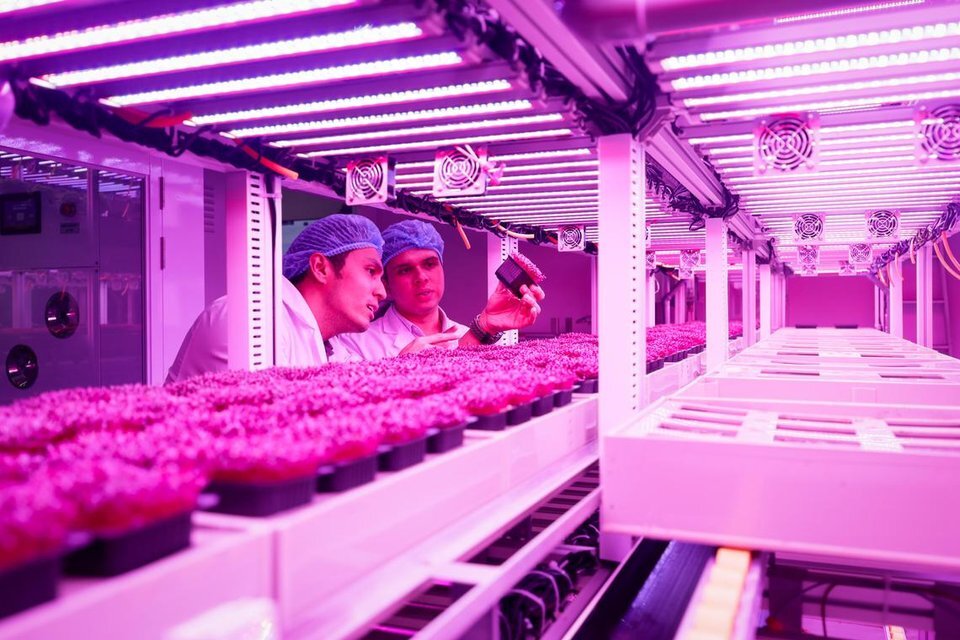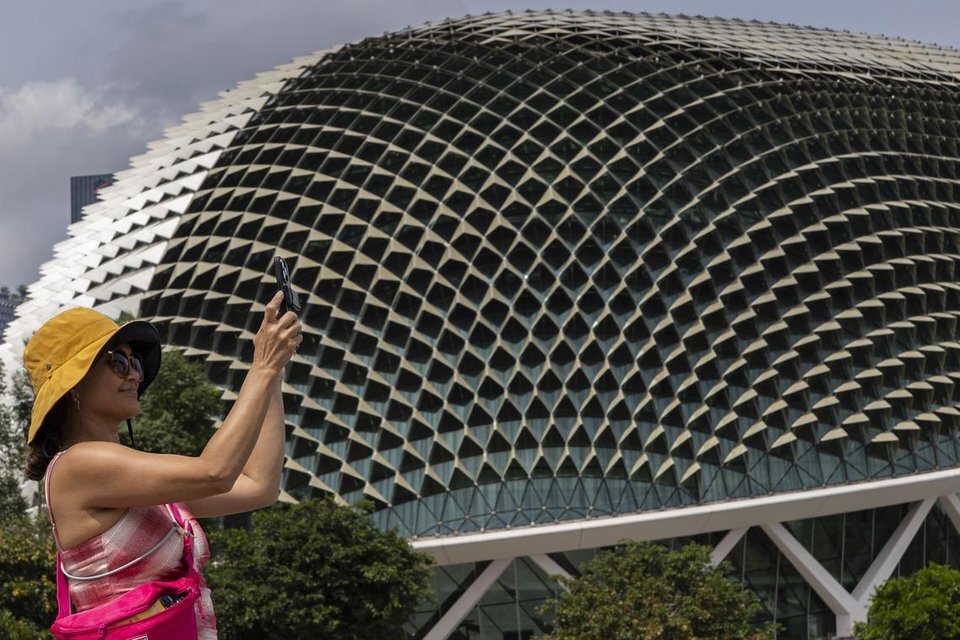Field trip held to attract more donations to environmental and climate causes in S’pore


SINGAPORE – Donations to environmental causes in Singapore have lagged behind areas like social service and welfare, accounting for 4 per cent of giving here in 2023.
Giving to environmental causes accounted for just $510,000, or about 1.78 per cent of grants disbursed between April 2024 and March 2025 by the Community Foundation of Singapore (CFS), which pools and facilitates donations.
Noting the low support, CFS on June 10 held its first trip for donors to learn – occasionally hands-on – about efforts in the environmental and climate space, in a bid to accelerate giving to these areas.
More than 30 people, comprising private and corporate donors, as well as CFS’ partners, participated in the visit to ITE College East in Simei, where they attended talks and a tour of the campus’ sustainability initiatives.
Addressing current and prospective donors on the visit, NUS Centre for Nature-based Climate Solutions deputy director Adrian Loo said: “I think the environment is like planting a tree.
“You don’t plant it for this generation, you plant it for the next generation.”
The former National Parks Board director recalled how visitors would take refuge in the coolness of Singapore’s forests during the Covid-19 pandemic, instead of parks. It was a demonstration of the key role that nature can play for people.
Dr Loo called on donors to support the centre’s “active work”, which goes beyond research to help other communities in South-east Asia take stock of their biodiversity and earn revenue from biodiversity credits.
Also among those looking to raise funds is chief executive of Waterways Watch Society, Mr Eugene Heng, who heads the volunteer group that patrols waterways in Kallang, Punggol and Jurong to ensure that they remain clean.
Showing donors images of rubbish floating in these channels, Mr Heng said the non-profit group’s efforts to organise litter-picking programmes help people of all ages take ownership of Singapore’s waters.
He noted that pre-schools have in recent years subscribed to the group’s activities more often than primary and secondary schools, even though they tend to lack the budget for these programmes.
Mr Heng added: “What we’re looking for is sustainable donors, because it’s very hard for us to plan for three to five years.”
The group, which has benefited from CFS’ grants, hopes to raise $147,700 for its waterways clean-up and learning trail, which teaches students about water conservation.
As part of the June 10 trip, participants visited the campus’ automated farming facility, solar panel farm and wormery. There, they had the opportunity to remove worms from nutritious compost converted from the cafeteria’s food waste, and return the creatures to their artificial homes.
These initiatives are part of ITE’s environmental stewardship programme, which the foundation aims to fund.
The programme’s chairwoman, Ms Catherine Soh, told participants that an interest in climate and environment typically ranks among the lowest priorities for students choosing extracurricular activities, as compared to other interests like sports and dancing.
She said: “Honestly, if I don’t share about the environment and sustainability, very few will come (to these programmes).”
CFS chief executive Paul Tan said he sees potential in driving momentum in the climate and environment space as, while small, interest appears to be growing.
He cited studies by the National Volunteer and Philanthropy Centre, which showed that 4 per cent of donations in Singapore went to environmental organisations in 2023, double the 2 per cent in 2021. Religious organisations received the most donations, at 37 per cent.
Said Mr Tan: “Through (the trip), we hope to help donors connect the dots, showing how their giving can support critical research, community-led solutions and education that complement national efforts.”
This comes amid Singapore’s efforts to position itself as a philanthropic hub, driven by its flourishing wealth management sector and attractive tax incentives.
Privately held companies here that manage the wealth of ultra-rich families have grown over the past four years.
From just 400 of such single family offices awarded tax incentives in Singapore in 2020, the number shot up to more than 2,000 by the end of 2024.
Some of the richest people in the world have also set up charities in Singapore in recent years, including American hedge fund billionaire Ray Dalio, Indonesian coal king Low Tuck Kwong, and Brazil-born Facebook co-founder Eduardo Saverin.
They will be joined by Microsoft co-founder Bill Gates, who announced plans in May to set up an office for his philanthropic organisation in Singapore.
Source: The Straits Times © SPH Media Limited. Permission required for reproduction.
SINGAPORE - Donations to environmental causes in Singapore have lagged behind areas like social service and welfare, accounting for 4 per cent of giving here in 2023.
Giving to environmental causes accounted for just $510,000, or about 1.78 per cent of grants disbursed between April 2024 and March 2025 by the Community Foundation of Singapore (CFS), which pools and facilitates donations.
Noting the low support, CFS on June 10 held its first trip for donors to learn – occasionally hands-on – about efforts in the environmental and climate space, in a bid to accelerate giving to these areas.
More than 30 people, comprising private and corporate donors, as well as CFS’ partners, participated in the visit to ITE College East in Simei, where they attended talks and a tour of the campus’ sustainability initiatives.
Addressing current and prospective donors on the visit, NUS Centre for Nature-based Climate Solutions deputy director Adrian Loo said: “I think the environment is like planting a tree.
“You don’t plant it for this generation, you plant it for the next generation.”
The former National Parks Board director recalled how visitors would take refuge in the coolness of Singapore’s forests during the Covid-19 pandemic, instead of parks. It was a demonstration of the key role that nature can play for people.
Dr Loo called on donors to support the centre’s “active work”, which goes beyond research to help other communities in South-east Asia take stock of their biodiversity and earn revenue from biodiversity credits.
Also among those looking to raise funds is chief executive of Waterways Watch Society, Mr Eugene Heng, who heads the volunteer group that patrols waterways in Kallang, Punggol and Jurong to ensure that they remain clean.
Showing donors images of rubbish floating in these channels, Mr Heng said the non-profit group’s efforts to organise litter-picking programmes help people of all ages take ownership of Singapore’s waters.
He noted that pre-schools have in recent years subscribed to the group’s activities more often than primary and secondary schools, even though they tend to lack the budget for these programmes.
Mr Heng added: “What we’re looking for is sustainable donors, because it’s very hard for us to plan for three to five years.”
The group, which has benefited from CFS’ grants, hopes to raise $147,700 for its waterways clean-up and learning trail, which teaches students about water conservation.
As part of the June 10 trip, participants visited the campus’ automated farming facility, solar panel farm and wormery. There, they had the opportunity to remove worms from nutritious compost converted from the cafeteria’s food waste, and return the creatures to their artificial homes.
These initiatives are part of ITE’s environmental stewardship programme, which the foundation aims to fund.
The programme’s chairwoman, Ms Catherine Soh, told participants that an interest in climate and environment typically ranks among the lowest priorities for students choosing extracurricular activities, as compared to other interests like sports and dancing.
She said: “Honestly, if I don’t share about the environment and sustainability, very few will come (to these programmes).”
CFS chief executive Paul Tan said he sees potential in driving momentum in the climate and environment space as, while small, interest appears to be growing.
He cited studies by the National Volunteer and Philanthropy Centre, which showed that 4 per cent of donations in Singapore went to environmental organisations in 2023, double the 2 per cent in 2021. Religious organisations received the most donations, at 37 per cent.
Said Mr Tan: “Through (the trip), we hope to help donors connect the dots, showing how their giving can support critical research, community-led solutions and education that complement national efforts.”
This comes amid Singapore’s efforts to position itself as a philanthropic hub, driven by its flourishing wealth management sector and attractive tax incentives.
Privately held companies here that manage the wealth of ultra-rich families have grown over the past four years.
From just 400 of such single family offices awarded tax incentives in Singapore in 2020, the number shot up to more than 2,000 by the end of 2024.
Some of the richest people in the world have also set up charities in Singapore in recent years, including American hedge fund billionaire Ray Dalio, Indonesian coal king Low Tuck Kwong, and Brazil-born Facebook co-founder Eduardo Saverin.
They will be joined by Microsoft co-founder Bill Gates, who announced plans in May to set up an office for his philanthropic organisation in Singapore.
Source: The Straits Times © SPH Media Limited. Permission required for reproduction.
- Related Topics For You: DONOR STORIES, DONOR-ADVISED FUND

.jpg)

